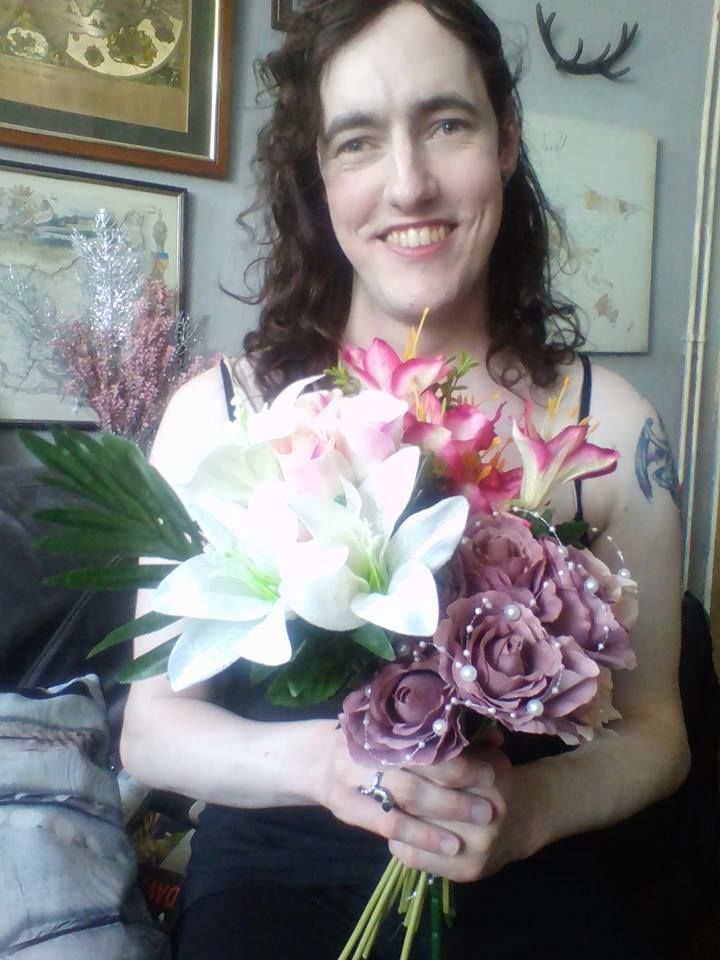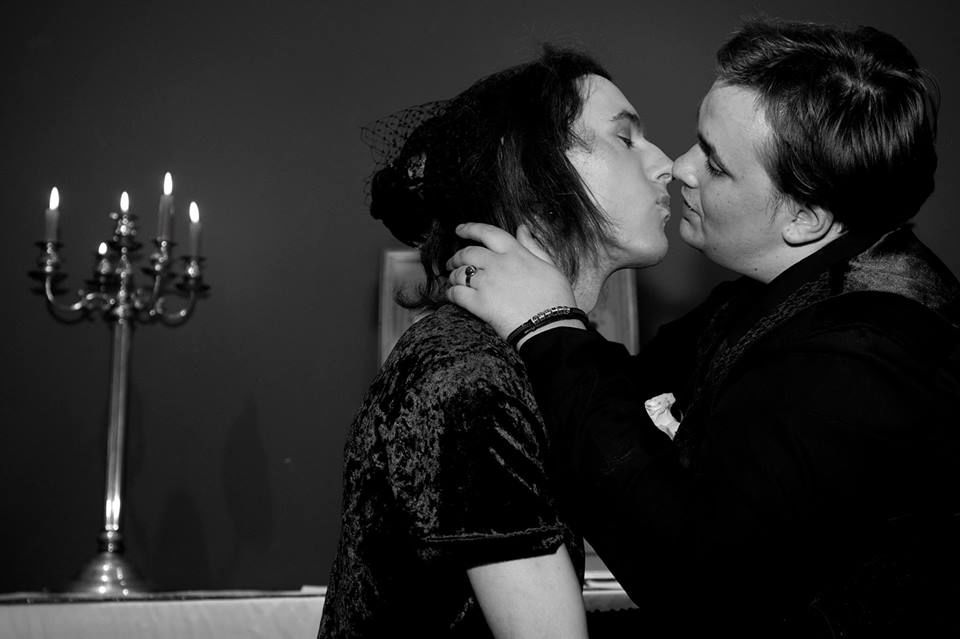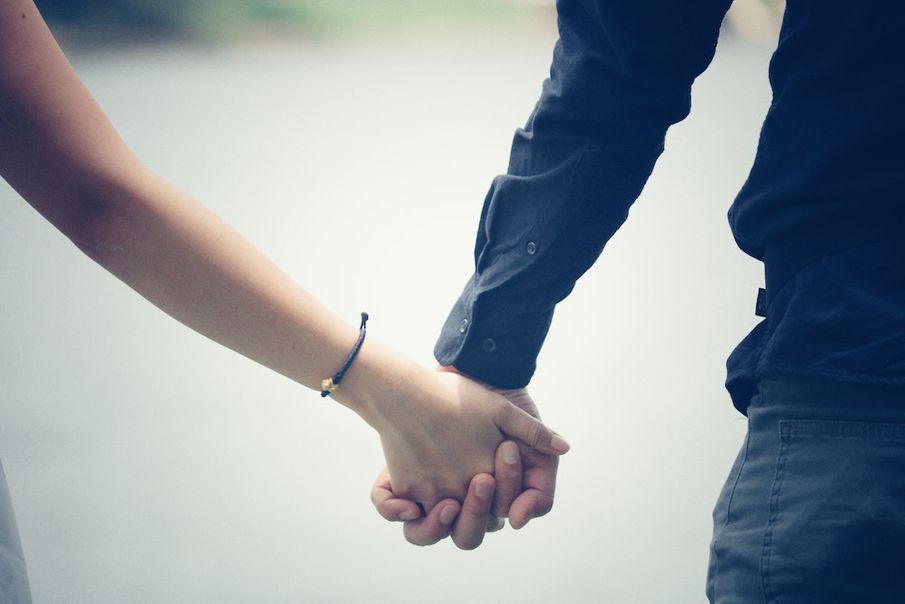Contending with mental health and neurodiversity, Ashley and wife Morgana faced even more difficulties than most when it came to embracing – and showing the world – who they truly are
I married Morgana on Halloween in 2015. We didn’t have a lot of money, so our reception was a buffet at a friend’s house, and the music a YouTube playlist.
In a nice touch of synchronicity, the neighbours were having an early Bonfire Night; the spectacular fireworks at the end of their display coincided with everyone heading outside for taxis home. Morgana wore a full-length, crushed velvet dress in crimson. My waistcoat and tie matched perfectly. Our first dance was The Pogues’ ‘Fairytale of New York’. There was a cake smash, photos, and a lot of laughter. Just a normal, slightly alternative wedding.
Except that Morgana and I are both trans. I’ve medically and surgically transitioned, finishing things to the extent I wanted to take them in 2010, having changed my name in 2005. I took the full version of a nickname I’d chosen in 1996, when I was 10 – the year I’d cut my hair short.
There had never been a time, in the five years my parents had allowed me to choose my own clothes, that I’d gone for dresses, despite growing up with several friends who were happy being girls, and saw no reason why tree-climbing and skateboarding couldn’t be done in pretty, feminine clothes. I knew women who were practical and competent. But I’d always headed for jeans and T-shirts. I built dens, drove go-karts, climbed trees, and created elaborate stories that I acted out with my toy cars and Lego.

Ashley's wife, Morgana
Morgana had just started to bring her feminine self into the world when we met in 2013, having gone through the route of not really identifying with gender or sexuality at all, thinking she must be a gay man, because she didn’t feel anything for the girls her male friends were pursuing, and then coming across the idea of asexuality, and feeling that made a lot more sense than anything else.
She is still asexual, as am I, but her hair has grown out into a long, thick waterfall of dark curls, while the summer dresses that contrasted so strikingly with that short hair have been replaced with pastel jeans, vintage-inspired blouses, and humorous T-shirts.
Morgana and I both live with mental health and neurodiversity, and this has caused a lot of difficulty in our path to introducing the world to ourselves.
My initial referral to Charing Cross Gender Identity Clinic, London, was delayed for almost a year and a half, because I have schizophrenia. This, it was believed, meant that a ‘lack of a permanent sense of self’ made it impossible for me to be trans, even though I’d been permanently identifying as ‘not a girl’ for at least a decade prior to making it in front of a gender identity specialist.
Despite the unwavering insistence of just about every part of the medical community that people with schizophrenia don’t have a fixed sense of self, my identity as a working class bloke who prefers to form intimate relationships with women, has more of an affinity with dogs than cats, enjoys both the reading and the writing of books, and starts to get restless if he’s kept indoors for too long, has never shifted.
Morgana has Asperger’s, and, since hers came without the ‘brilliant at IT’ upgrade, but did have the free add-on of social anxiety, she has struggled to find paid employment. Those who decide whether trans people are allowed to have hormones and surgery (assuming they want either, which they may or may not) don’t like it if you’re not working.
The ‘safe spaces’ that the media mocks are where people like us go to rearm and fortify, not where we go to fall apart
For Morgana, the anxiety of being criticised for ‘not working’ means that, for the moment, she has chosen to simply ‘get on with being a woman’, and let go of the investment in doing things ‘officially’.
Social media makes it easy for the defiantly different to find each other; a refuelling stop before we go out into the world again.
I’ve spent years living and working stealthily, going in to male-dominated workplaces, biting my tongue as I sat through ‘equality and diversity training’ led by someone who was clueless about a transgender person working at the company. I’ve had managers try to force me into sexual situations with female colleagues, to ‘prove you’re not a faggot’. I’ve had to come up with an explanation as to why a ‘bit of banter’ made me so uncomfortable, that doesn’t out me.
After days like that, knowing my social media feed will include people who’ll make me laugh, inspire raging hair and fashion lust, and provide enjoyable, intellectually engaging discourse, is essential to my wellbeing.
For Morgana, social media has allowed her to find other autistic, nerdy women, many of whom happen to be trans. She gets the respite of being in a society where she’s not out of step, or running to catch up, and where people engage with her naturally, and respect her without conditions.
Even in the communities we’ve found, the opinions of the rest of the world still get in, as people try to process hate-filled headlines, inaccurate representation, and personal encounters.

Ashley and Morgana have been married since 2015
What it is, is our space – filled with and dominated by people who understand and accept us, even if they don’t like us. And that makes it safe. It gives us the same ‘world-adjacent’ respite as people who experience the privilege of being automatically accepted by society.
I was trans before social media took hold. I was schizophrenic before people talked openly. Morgana grew up as an autistic person without the benefit of a social media scene that allowed her to meet others like her. She was trans in the physical reality first.
We would get by without it, but social media makes it a lot easier to manage our mental health and neurodivergence. The ‘safe spaces’ the media mocks are where people like us go to rearm and fortify, not where we go to fall apart.
Being trans, being neurodivergent, having mental health issues, will never be easy, but the same social media that gives those who object to our existence an outlet, also provides us all with an enjoyable, accessible way to affirm our personhood, and our right to enjoy the world, as well as embracing our own definition of success.
Fe Robinson | MUKCP (reg), says:
Ashley and Morgana’s story shows the importance of being true to who you know yourself to be, especially when others do not understand, or even seek to undermine you. Managing more than one aspect of diversity, it is heartening to hear how social media has allowed them to build the sense of community we all need in our lives. Their resilience is a moving testament to what is possible if we stay true to our own values, and way of being in the world.


Comments